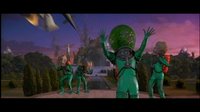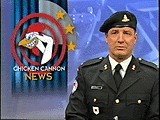There is always a risk that discussion of national unity or federal-provincial power distribution will cause rampant insomnia, or as with others, a debilitating case of apoplexy.
 [Left: At the thought of yet another constitutional debate, Canadians' heads started to explode.]
[Left: At the thought of yet another constitutional debate, Canadians' heads started to explode.]This is the risk we took yesterday in suggesting people take a gander at Andrew Coyne's column in the
National Post.
The risk is well worth it, though, especially when Michael Ignatieff's comments have earned praise from no less a sovereignist than former Quebec Premier Bernard
Landry. Landry welcomed Ignatieff's proposal to recognize that Quebec is a nation and then proceeded, as reported by CBC Radio, to point out that it is only logical to wonder why a nation - which as a nation Landry equated in French interviews to sovereign states - would have the same political powers within Canada as Prince Edward Island.
Landry has also been quoted extensively by French language media on the same issue.
 [Photo right: La Presse. For a moment, Bernard couldn't remember which finger he needed to raise to Canada.]
[Photo right: La Presse. For a moment, Bernard couldn't remember which finger he needed to raise to Canada.] To further the discussion, following is the column by Stephane Dion published in the
National Post on Thursday, October 26.
Dion will undoubtedly raise the ire of a great many of the local landrys but then again that is a risk we shall have to take. It's either this, Slim Whitman recordings or an mp3 loop of Danny's dirge.
Either will cause the brain of your average sovereignist to pop.
What, exactly, do we mean by "nation"?Stephane Dion
National PostOctober 26, 2006
Before entering politics, more than 10 years ago, I maintained that we Quebecers could be described as forming a nation, in the civic and sociological sense of the term. Last Saturday, however, I voted against the resolution put forward by the Quebec wing of the Liberal Party of Canada calling for the party to undertake the necessary steps toward a formal recognition of Quebec as a nation.
Before we ask other Canadians to support such a formal recognition (in the constitution, no doubt) we should first of all determine what we expect from such a recognition. Hiding behind the apparent consensus in Quebec on this question are at least three disagreements.
- First question: Are Quebecers the only nation to be recognized within Canada, or will we accept that other groups, heartened by our example, be given the same recognition? Will the pressure exercised by an undetermined number of groups in Canada, including groups in Quebec, to be recognized as nations lead us to conclude that our own national recognition has been trivialized or diluted?
- Second question: Is this recognition necessary or is it merely desirable? Those who say it is necessary must follow their reasoning to its conclusion: If we Quebecers do not obtain this recognition then we must leave Canada. Indeed, one cannot live without something that is necessary.
Those who say that, on the contrary, this recognition would only be a good thing to obtain should not place it at the heart of the Canadian unity debate. You do not break up a country on account of something that is good but not necessary.
- Third question: Do we want this recognition to be purely symbolic or do we want it to lead to concrete consequences on, say, the division of powers or the allocation of public funds? And how does this approach square with the previous question? It is contradictory to affirm that the recognition of Quebec as a nation is necessary but purely symbolic. But that is the untenable position Michael Ignatieff has decided to advocate. Gilles Duceppe, the Bloc Quebecois leader, and Claude Morin, the former PQ minister, have already responded that if the recognition of Quebec as a nation in Canada is important then it must bring about "something" beyond symbolism.
We've seen this movie three times already. First it was the debate on the constitutional recognition of Quebec as a "distinct society" contained in the Meech and Charlottetown accords. Then came the Calgary Declaration, a 1997 episode which few people remember. The premiers of the other provinces tried to define, for us Quebecers, the type of recognition we wanted. They had their legislatures adopt a declaration that recognized "the unique character of Quebec society." When the declaration landed in Quebec, the province's political class rejected it, stating that this recognition "had no teeth."
So, here is my position: I am proud to belong to the Quebec nation within Canada. The constitutional recognition of such a fact, although desirable, is not necessary because nothing prevents us Quebecers from participating and succeeding in this great endeavour that is Canada, a country we have contributed so much to building.
Nothing can justify our renouncing our Canadian identity. Such a rupture would be a tragedy, for ourselves, our children and future generations. We should not be encouraged to make such a mistake on the basis of a recognition that is desirable but not necessary. That is my position and I am more than willing to debate it because I do not underestimate the importance of symbols and recognition. But I do not believe that we should ask other Canadians for such a recognition until we have clarified what we are hoping to obtain from it.
Although it is an important one, I do not believe this debate is the most important thing we can do to improve Quebec and Canada as a whole. For me, the main priority by far is to ensure Canada is part of the solution, not the problem, to the crucial challenge of the 21st century: how to reconcile humanity with the ecological limits of the planet. That is the vision and the plan of action I am proposing to Canadians in order to combine the three pillars of our success: economic prosperity, social justice and environmental sustainability.
Quebecers have better things to do than to see this movie for a fourth time. We should mobilize ourselves to make our country a pathfinder in the 21st century. Let's contribute all our talents, energies and our own culture, as we have always done in the past, when we have had to respond with other Canadians to great challenges.












